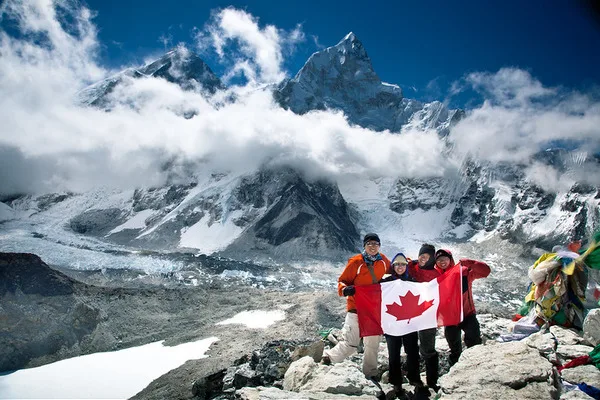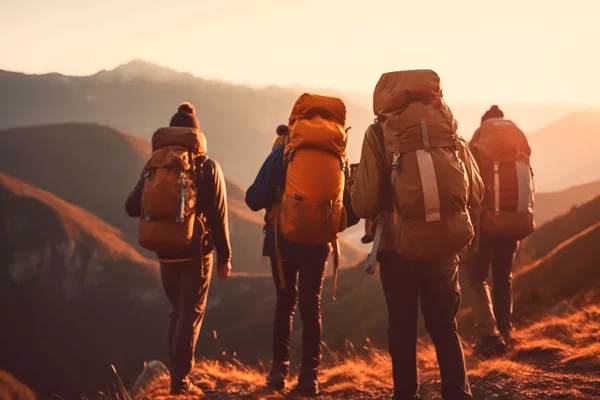The Summits Of Canada Team welcomes you and invites you to join us in a truly unique, challenging and exciting adventure. Follow us as we pursue our quest of reaching the summit of ALL 13 high-points in each and every Province and Territory in Canada.

Author : Frederick Lin – flickr.com
The Summits of Canada Expedition and the 13 summits require a wide range of climbing and technical skills. The journey and the quest for each summit has been spread over many years, with more demanding trips that have ranged anywhere from 7 to 30+ days each. Weather windows and personal schedules have, of course, been key factors in determining who is able to join the group each year. As such, the team members have changed over time for this unique and exciting adventure-learning project.
James Coleridge – Expedition Leader
- Summited McKinley, Aconcagua, Elbrus, Kilimanjaro
- Altitude experience to 24,000’
- 20 years climbing rock and ice in BC
- Small business award winner
- Former animation producer with Warner Bros. USA
- 21 years as elected City Councillor in White Rock, British Columbia
- International, National award and competition winner 2010
Len Vanderstar – Expedition Coordinator
- Climbs include: North Face Mount Athabasca – night time winter ascent, Mount Ida/Sir Alexandra Range, North couloir ascent of Brian Boru, SSW Ridge Mount Robson, Mount Rainier
- Alpine Club of Canada Trip Leader
- Experienced ice climber
- Experienced white-water rafter and canoer
- First Aid Co-ordinator and ambulance attendant
- Habitat Protection Biologist for the BC Ministry of Environment
The following lists represent the team members for each climb.
- Alberta – Mt. Columbia – 1st Attempt (June, 2006) : James Coleridge, Len Vanderstar, Melissa Welsh, Scott Fiddes, Shawn Fearing, Will Cadell
- Alberta – Mt. Columbia – 2nd Attempt (August, 2006): James Coleridge, Len Vanderstar, Will Cadell
- Ontario – Ishpatina Ridge (September, 2006): James Coleridge, Jessica Pearson, Len Vanderstar, Melissa Welsh, Shawn Fearing, Will Cadell
- Manitoba – Mt. Baldy (December, 2006): Anna Coleridge, James Coleridge, Yoda Coleridge (woof)
- Yukon Territory – Mt. Logan – 1st Attempt (May, 2007) : Adam Burrell, Andy Traslin, Catherine Ranger, Danylo Darewych, James Coleridge, Josh Lazzari, Len Vanderstar, Mike Traslin, Samantha O’Carroll, Shawn Fearing, Stephanie Falz, Travis Hunt, Urszula Tokarska
- Yukon Territory – Mount Logan – 2nd Attempt (June, 2008): James Coleridge, Len Vanderstar
- British Columbia – Fairweather (June, 2009) : James Coleridge, Len Vanderstar
- Saskatchewan – Cypress Hills (November, 2011): James Coleridge, Len Vanderstar
- New Brunswick – Mount Carleton (May, 2012): James Coleridge, James Coleridge
- PEI – Glen Valley (May, 2012) : James Coleridge, Len Vanderstar
- Nova Scotia – White Hill (May, 2012): James Coleridge, Len Vanderstar
- Northwest Territories – Un-named Peak – 1st Attempt (July, 2013) : Brian Friedrich, James Coleridge, Len Vanderstar
- Newfoundland/Labrador/Quebec – Mt. Caubvick & D’Iberville (August, 2014): Brian Friedrich, Laura Friedrich, Len Vanderstar
- Manitoba – Mt. Baldy : Brigitte Beauregard , Len Vanderstar, Michel Theriault, Qasim Warnick
- Alberta – Mt. Columbia (May, 2015): Len Vanderstar, Marc Aymerich, Marta Coletas Vegas, Michel Theriault, Brigitte Beauregard
- Northwest Territories – Un-named Peak – 2nd Attempt (July, 2015) : Barry Watson, Dave Custler, Eric Gilbertson, Greg Slayden, Lana Pflugbeil, Len Vanderstar, Luke Weyman, Marc Aymerich, Rick Taylor, Ron Vanderstar, Shelley Browne, Susan Ruff
- Northwest Territories – Thunder Mountain (Mt. Nirvana) – (June, 2016): Eric Gilbertson, Len Vanderstar, Luke Weyman, Ron Vanderstar
- 18 – Nunavut – Barbeau Peak (June, 2017): Eric Gilbertson, Brian Friedrich, Laura Friedrich, Len Vanderstar, Serge Massad.
Training and Preparation Tips
Physical Conditioning
Commence by laying a robust foundation of physical fitness. Concentrate on bolstering cardiovascular endurance, strength, and flexibility through activities like hiking, running, cycling, and swimming.
Altitude Training
Given that numerous high-altitude climbs entail coping with thin air and reduced oxygen levels, it’s imperative to accustom your body to such environments. Incorporate altitude training methods like simulated altitude training or hiking at higher elevations into your regimen.
Technical Skills
Foster proficiency in fundamental climbing and mountaineering techniques such as rope handling, knot tying, glacier travel, and ice climbing. Enroll in courses provided by certified guides or climbing schools to acquire these skills under expert supervision.
Mental Preparation
Mental resilience is as vital as physical strength when tackling daunting climbs. Practice visualization, positive self-talk, and stress management techniques to navigate adversity and maintain focus during challenging situations on the mountain.
Equipment Selection
Invest in top-notch gear tailored to the specific terrain and conditions you’ll encounter during your expedition. This encompasses clothing layers, footwear, backpacks, tents, sleeping bags, and climbing equipment. Ensure your gear is properly fitted and tested beforehand.

Nutrition and Hydration
Maintain a well-balanced diet comprising carbohydrates, proteins, healthy fats, and ample hydration. During prolonged climbs, replenish your energy levels with nutrient-dense snacks and stay hydrated to stave off altitude-related ailments.
Safety Protocols
Prioritize safety by adhering to established protocols and guidelines at all times. Familiarize yourself with emergency procedures, weather forecasts, route maps, and communication devices. Always climb with experienced partners and be prepared to make informed decisions in changing conditions.
Conclusion
The Summits of Canada Team undertakes a challenging quest to summit all 13 high-points in each Province and Territory, offering a unique and exciting adventure. The expedition requires a diverse range of climbing and technical skills, spread over years and varying trip durations, with changing team members due to weather and personal schedules. Key team members include James Coleridge, with extensive climbing experience and leadership roles, and Len Vanderstar, skilled in climbing, wilderness survival, and habitat protection. Each climb involves careful planning and coordination, with team members listed for each attempt, showcasing the dedication and perseverance of the team. Training and preparation tips are essential, focusing on physical conditioning, altitude training, technical skills, mental preparation, gear selection, nutrition and hydration, and safety protocols to ensure a successful expedition.
FAQs
What are the Summits of Canada?
The Summits of Canada is an expedition that aims to summit all 13 high-points in each Province and Territory of Canada, providing participants with a unique and thrilling adventure.
What skills are required for the expedition?
The expedition requires a diverse range of climbing and technical skills, including rope handling, knot tying, glacier travel, and ice climbing, along with physical fitness, mental resilience, and wilderness survival skills.
How long does each expedition last?
The duration of each expedition varies, ranging from 7 to 30+ days, depending on factors such as weather conditions, route difficulty, and team members’ schedules.
Who are the key team members?
Key team members include James Coleridge, who brings extensive climbing experience and leadership roles, and Len Vanderstar, skilled in climbing, wilderness survival, and habitat protection.
How is the team composition determined?
The team composition may vary for each expedition due to weather conditions and personal schedules. Team members are selected based on their availability, expertise, and compatibility with the expedition’s goals.